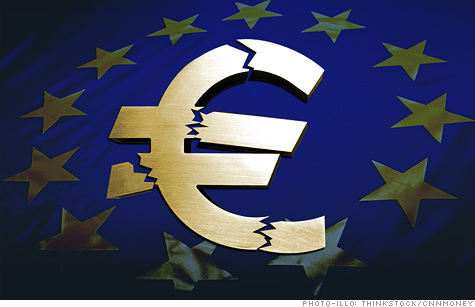
As European leaders unveil their latest plan to solve the debt crisis, economists and market experts aren't convinced they'll actually be successful. There are one too many obstacles and chances are, the currency union will break up, triggering an end of the euro as we know it. The collapse of the euro is inevitable without the ECB's virtually limitless financial support. ECB President Mario Draghi has firmly said, time and time again, that the central bank's only mandate is to prevent inflation. Unless the ECB begins to operate as a sovereign lender of last resort function, with massive purchases of eurozone public debt, the inexorable logic is that the eurozone will break up.
European leaders, particularly from France and Germany -- the eurozone's two largest economies -- have had very different views on the ultimate role of the fiscal compact, and the latest proposals are just "too little, too late, and miss the structural problem. Germany has been strongly opposed to sending the ECB down a path of printing money to stabilize Europe's economy. Europe's hard hit "Club Med" economies like Greece, Italy and Spain could be driven "to the point where they deem it in their national interest to exit the euro," despite the immediate economic, political and practical consequences. And it could happen in the next six months.
The fiscal union needs to focus more on boosting economic growth, rather than just pushing for budgetary discipline and fiscal austerity. And it needs to advocate for pooling the eurozone's debt together, so the region can issue eurobonds, another highly contentious topic among Europe's political leaders. Despite the multitude and extent of the political disagreements that could lead to the eurozone's crumble in the near-term, more optimistic experts say Europe's leaders will likely find a middle ground to avoid the severe economic consequences. A break-up could result in very major recession in Europe, and so it's hard to imagine how any politicians and governments could possibly make a conscious, voluntary decisions to leave the eurozone.
The chances that the eurozone will remain intact over the next several months are high, but the danger could get worse over the next couple of years, as they try and transition toward any sort of fiscal union,
No comments:
Post a Comment